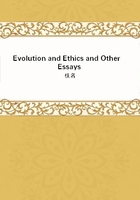
第76章
The "Times," December 29th, 1890-,Sir,--If Mr. Cunningham doubts the efficacy of the struggle for existence, as a factor in social conditions, he should find fault with Mr. Booth and not with me.
"I am labouring under no delusion as to the possibility of inaugurating the millennium by my social specific. In the struggle of life the weakest will go to the wall, and there are so many weak. The fittest in tooth and claw will survive. All that we can do is to soften the lot of the unfit, and make their suffering less horrible than it is at present" ("In Darkest England," p. 44).
That is what Mr. Cunningham would have found if he had read Mr. Booth's book with attention. And, if he will bestow equal pains on my second letter, he will discover that he has interpolated the word "wilfully" in his statement of my "argument," which runs thus: "Shutting his eyes to the necessary consequences of the struggle for life, the existence of which he admits as fully as any Darwinian, Mr. Booth tells men whose evil case is one of those consequences that envy is a corner-stone of our competitive system." Mr. Cunningham's physiological studies will have informed him that the process of "shutting the eyes," in the literal sense of the words, is not always wilful; and I propose to illustrate, by the crucial instance his own letter furnishes, that the "shutting of the eyes" of the mind to the obvious consequences of accepted propositions may also be involuntary.
At least, I hope so.
1. "Sooner or later," says Mr. Cunningham, "the population problem will block the way once more." What does this mean, except that multiplication, excessive in relation to the contemporaneous means of support, will create a severe competition for those means? And this seems to me to be a pretty accurate "reflection of the conceptions of Malthus" and the other poor benighted folks of a past generation at whom Mr. Cunningham sneers.
2. By way of leaving no doubt upon this subject, Mr. Cunningham further tells us, "The struggle for existence is always going on, of course; let us thank Darwin for making us realize it." It is pleasant to meet with a little gratitude to Darwin among the epigoni who are squabbling over the heritage he conquered for them, but Mr.
Cunningham's personal expression of that feeling is hasty. For it is obvious that he has not "realized" the significance of Darwin's teaching--indeed, I fail to discover in Mr. Cunningham's letter any sign that he has even "realized" what he would be at. If the "struggle for existence is always going on"; and if, as I suppose will be granted, industrial competition is one phase of that struggle, I fail to see how my conclusion that it is sheer wickedness to tell ignorant men that "envy" is a corner-stone of competition can be disputed.